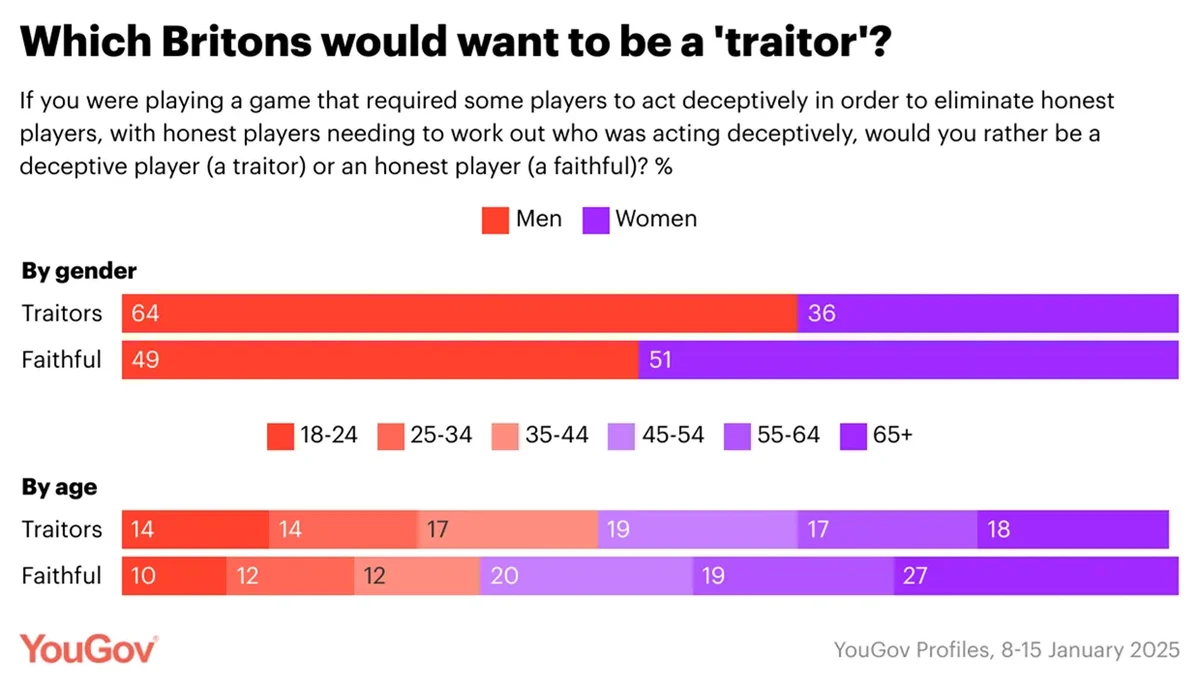The 20% of Britons who would choose to be a traitor are twice as likely to say they don’t mind being ruthless to get what they want
For millions of Britons, the twists and turns in the BBC’s hit series The Traitors has been an obsession for the last month, with many eager to find out whether this year’s traitors can outmanoeuvre the faithful.
As the show enters its final week, with the winners of the ultimate game of backstabbing to be crowned on Friday, we asked more than 35,000 Britons which side they’d prefer to be on if they were entering the Traitors’ castle. Using YouGov’s Profiles tool, we can create a detailed portrait of what sets the two groups apart.
Traitors are more likely to be men and younger than faithfuls
Overall, 20% of Britons say they would rather be a traitor, compared to 55% of the public who would prefer to be a faithful.
Profiles shows that traitors are much more likely to be men than faithfuls. While the gender divide for faithfuls is near evenly split (49% men, 51% women), fully 64% of traitors are men.
Those who would prefer to be a traitor also tend to be younger, with 45% of would-be traitors being under 45, compared to 34% of would-be faithfuls.

Traitors and faithfuls don’t, however, differ when it comes to social class or education.
What personality traits most set traitors and faithfuls apart?
Goal-orientation
Britons who would prefer to be traitors tend to be more goal-oriented than faithfuls. Most notably, traitors are nearly twice as likely as faithfuls (39% vs 20%) to say they don’t mind being ruthless in order to get what they want.
Likewise, 51% of traitors believe that performing well in a game is essential to having fun, compared to 44% of faithfuls.
Deceptiveness
For the TV traitors, key to the game is being able to deceive and mislead their fellow contestants, and likewise among the wider public we see a greater willingness to be deceptive among our wannabe traitors. Two thirds (65%) say that some secrets are necessary in a relationship, compared to 54% of faithfuls. Likewise, traitors are more likely to say they have ever lied about their age (47% vs 33%) and that they have exaggerated their experience on their CV (27% vs 15%).
Having the power to convince others will similarly set TV traitors in good stead, and indeed the traitors in our survey are more likely to say that they can usually convince people to see things their way (42% vs 30% of faithfuls), and also that they are more of a leader than a follower (46% vs 36%).
Our traitors may also fancy their chances at another TV competition: Hunted, which sees contestants try to outrun investigators for a period of 21 days. A third of traitors (35%) say that have put some thought to where they would go and what would they do if they had to go on the run, relative to just 20% of faithfuls.
Likewise, in the event that they were being hunted by the police, 26% of traitors think they could evade capture for at least three weeks, compared to only 14% of faithfuls. Indeed, faithfuls are substantially more likely to say they wouldn’t last a day (33% vs 19%), raising the prospect that many are inclined to just immediately turn themselves in, which leads in to our next theme...
Rule-following
Given the nature of the roles, it is perhaps no surprise to see that Britons who are more drawn to the role of traitor are also more likely to say that “rules are meant to be broken” (40% vs 28% of faithfuls).
Traitors are also more likely to say that they breached covid rules during lockdown (50% vs 35% of faithfuls), while faithfuls are likewise more likely to say that if they tested positive for covid they would stay at home entirely (51% vs 36% of traitors).
Faithfuls are also twice as likely to say that they follow “very closely” when airline cabin crew give safety guidance before a plane takes off (18% vs 9%).
Risk-taking
Our Profiles data shows that traitors have greater risk-taking and thrill-seeking tendencies than their faithful counterparts.
Traitors are more likely to say that they enjoy taking risks in general (40% vs 28%), and to say that they seek out challenging situations (38% vs 28%). Likewise on a more specific financial question, faithfuls are more likely than traitors to say that “investing in stocks and shares seems risky” (54% vs 63%).
Space-related insights into risk-aversion show that faithfuls are noticeably less likely to want to meet an alien (71% vs 83%) and are less likely to like the idea of participating in a spacewalk (31% vs 47%).
More earthly examples include faithfuls being less likely to say they enjoy rollercoasters (40% vs 54% of traitors) and less likely to want to visit North Korea as a tourist (13% vs 29%).
Attitudes to money
The TV traitors are motivated in their misdeeds by a £120,000 jackpot, and our public traitors are also more likely to be money centric, including tending to prefer games that offer a big reward (29% vs 23%). Additionally, seven in ten traitors (69%) believe that money does buy happiness, compared to 55% of faithfuls, while also being more likely to feel that success is best measured by wealth (25% vs 19%) and that they’d rather be rich and unloved than poor and loved (35% vs 23%).
Political views
The two groups are also somewhat distinct when it comes to their political views, with traitors tending to hold views that favour freedom of choice for the individual, reiterating that they are less engaged in following rules than faithfuls.
Traitors are more likely to oppose restrictions on abortion (62% vs 55%) and prostitution (40% vs 29%), while also being more likely to favour liberalisations such as gay marriage (73% vs 66%), euthanasia (88% vs 80%) and the legalisation of cannabis (56% vs 50%).
But while this might sound like traitors are more progressive, they are also more likely to oppose political correctness (58% vs 48%), as well as being against positive discrimination on both racial (48% vs 39%) and gender grounds (40% vs 29%).
There is also greater opposition to more traditional left-wing politics among traitors, with them more likely to say that trade unions are “a force for bad” (34% vs 25%), that welfare benefits are too high (34% vs 29%) and that public utilities should not be nationalised (27% vs 19%).
Learn more about YouGov Profiles
How do you feel about The Traitors, other reality TV shows, and everything else? Have your say, join the YouGov panel, and get paid to share your thoughts. Sign up here.
Photo: Getty









